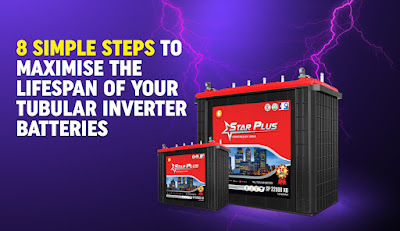Electricity plays a vital role in our lives. Electrical appliances like TVs and computers need a constant electricity supply to function. Not only household appliances but industrial machines also need electricity to function.
However, power cuts are not uncommon, and though the frequency of them varies with time and place, they are disastrous. They impede workflow, and nothing can be worse than that. This is the reason why several power backup solutions have been invented to enjoy an uninterrupted power supply. Backup solutions like inverters play a major role in areas with frequent power outages.
Batteries are an integral part of an inverter, and every battery, including a tubular inverterbattery, needs proper maintenance for it to perform optimally for a long time. Here are some maintenance tips to follow.
Install the Battery in a Well Ventilated Place
Maintaining your battery begins right from the installation. Install the battery in a well-ventilated airy place. During charging and operation, an inverter battery gets heated up. This heat reduces the life and efficiency of the battery. Proper ventilation reduces heat up and increases the life of the battery.
Use Your Battery Regularly
It is recommended to use your inverter and battery for inverter regularly. Even if there are no power cuts, you must discharge your battery at least once a month. This is required to maintain the charge. It is also beneficial to maintain battery health.
Check the Water Level of the Battery Regularly
Check the water level of your inverter battery regularly. Also, make sure you maintain the water level of your battery between the maximum and minimum levels. When topping your battery up with water, use only distilled or non-ionized water. Do not ever use tap water to top up your battery. Tap water may contain many impurities and excess minerals, which can affect the life and performance of the battery.
Keep the Battery Dust Free
Dust particles not only interfere with the operations of the battery but also decreases its life. Therefore, clean the battery regularly to keep it dust-free. Use a cotton cloth to clean the surfaces and sides of the battery of all dust and dirt particles.
Keep the Battery Terminals Rust Free
Rusting and corrosion areharmful to your tubular battery for an inverter. When the terminals catch rust, it restricts the current flow to and fro from the battery. This restricted flow results in slow battery charging, which reduces its life. To clean the battery terminals of rust and corrosion, pour hot water and baking soda onto the area and clean it off with a toothbrush. This should remove the corrosion. After removing the rust, apply a generous layer of petroleum jelly to prevent future corrosion.
Keep the Battery Out of Reach of Children
Keep the battery in such a place that it remains out of reach of children. Kids getting in contact with inverter batteries can have an adverse effect on both. Your children may injure themselves, and a part of the battery may also get affected because it is a very sensitive device.
Right Load on the Inverter Battery
Make sure you do not connect a load greater than what the inverter can carry. This will not only reduce the life of the battery but can also result in a damaged appliance or worse, a short circuit.
Wrapping It Up
Maintaining your battery correctly is important for it to perform optimally. The correct maintenance of your tubular inverter battery increases not only its lifespan but also its performance. Installing the battery in a well-ventilated place, keeping it rust and dust free, and checking the water level regularly are some of the steps you need to take to help it perform optimally.







